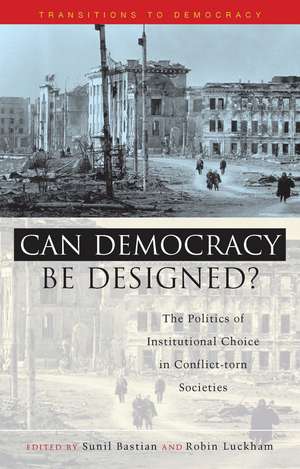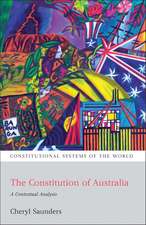Can Democracy be Designed?: The Politics of Institutional Choice in Conflict-Torn Societies
Autor Sunil Bastian, Robin Luckhamen Limba Engleză Paperback – 31 mai 2003
Constitution-making for democracy has always been a highly political and contested process. It has never been more ambitious, or more difficult, than today as politicians and experts attempt to build democratic institutions that will foster peace and stability in countries torn by violent conflict. The extended investigation out of which this book has grown has ranged across three continents. It has examined such apparently intractable cases as Bosnia-Herzegovina, Sri Lanka and Fiji, as well as apparent 'success stories' like South Africa, Ghana and Uganda.
Three groups of questions are explored:
* How and by whom were democratic institutions (re)designed?
* How have they functioned in practice: what has been the relationship between democratic institutions and democratic politics?
* How have they measured up to the pressures placed on them by ongoing violence, poverty, globalization and democratization itself?
The authors, while regarding democracy as a general entitlement, refuse to subscribe to a triumphalist view which sees it as a universal panacea. Instead they seek to understand how democratic institutions actually facilitate (or sometimes fail to facilitate) improved governance and the management of conflict in a variety of national settings.
This thoughtful and empirical set of explorations is highly relevant to other societies wrestling with similar problems of institutional design in situations of democratic transition and/or deep-seated social conflict.
Three groups of questions are explored:
* How and by whom were democratic institutions (re)designed?
* How have they functioned in practice: what has been the relationship between democratic institutions and democratic politics?
* How have they measured up to the pressures placed on them by ongoing violence, poverty, globalization and democratization itself?
The authors, while regarding democracy as a general entitlement, refuse to subscribe to a triumphalist view which sees it as a universal panacea. Instead they seek to understand how democratic institutions actually facilitate (or sometimes fail to facilitate) improved governance and the management of conflict in a variety of national settings.
This thoughtful and empirical set of explorations is highly relevant to other societies wrestling with similar problems of institutional design in situations of democratic transition and/or deep-seated social conflict.
Preț: 199.64 lei
Preț vechi: 230.61 lei
-13% Nou
Puncte Express: 299
Preț estimativ în valută:
38.21€ • 41.49$ • 32.09£
38.21€ • 41.49$ • 32.09£
Carte tipărită la comandă
Livrare economică 23 aprilie-07 mai
Preluare comenzi: 021 569.72.76
Specificații
ISBN-13: 9781842771518
ISBN-10: 1842771515
Pagini: 352
Ilustrații: notes, bibliography, index
Dimensiuni: 138 x 216 x 21 mm
Greutate: 0.44 kg
Editura: ZED BOOKS
Colecția Zed Books
Locul publicării:London, United Kingdom
ISBN-10: 1842771515
Pagini: 352
Ilustrații: notes, bibliography, index
Dimensiuni: 138 x 216 x 21 mm
Greutate: 0.44 kg
Editura: ZED BOOKS
Colecția Zed Books
Locul publicării:London, United Kingdom
Cuprins
Introduction: Can Democracy be Designed? Sunil Bastian and Robin Luckham
1. Democratic Institutions and Democratic Politics and Political Violence, Robin Luckham, Anne Marie Goetz and Mary Kaldor
2. The Politics of Institutional Design in the South African Transition, David Pottie and Shireen Hassim
3. The Reformulation of Ugandan Democracy, James Katalikawe and Aaron Griffiths
4. Ghana: The Political Economy of 'Successful' Ethno-Regional Conflict Management, E. Gyimah-Boadi
5. The Politics of Institutional Design: An Overview of the Case of Sri Lanka, Radhika Coomaraswamy
6. Proportional Representation, Political Violence and the Participation of Women in the Political Process in Sri Lanka, Kishali Pinto Jayawardena
7. The Political Economy of Electoral Reform: Proportional Representation in Sri Lanka, Sunil Bastian
8. Electoral Engineering and the Politicization of Ethnic Frictions in Fiji, Jon Fraenkel
9. Building Democracy from the Outside: The Dayton Agreement in Bosnia and Herzegovina, Marcus Fox
10. Managing Ethnic Conflicts: Democratic Decentralization in Bosnia-Hercegovina, Vesna Bojicic
11. Conclusion: The Politics of Institutional Choice, Sunil Bastian and Robin Luckham
1. Democratic Institutions and Democratic Politics and Political Violence, Robin Luckham, Anne Marie Goetz and Mary Kaldor
2. The Politics of Institutional Design in the South African Transition, David Pottie and Shireen Hassim
3. The Reformulation of Ugandan Democracy, James Katalikawe and Aaron Griffiths
4. Ghana: The Political Economy of 'Successful' Ethno-Regional Conflict Management, E. Gyimah-Boadi
5. The Politics of Institutional Design: An Overview of the Case of Sri Lanka, Radhika Coomaraswamy
6. Proportional Representation, Political Violence and the Participation of Women in the Political Process in Sri Lanka, Kishali Pinto Jayawardena
7. The Political Economy of Electoral Reform: Proportional Representation in Sri Lanka, Sunil Bastian
8. Electoral Engineering and the Politicization of Ethnic Frictions in Fiji, Jon Fraenkel
9. Building Democracy from the Outside: The Dayton Agreement in Bosnia and Herzegovina, Marcus Fox
10. Managing Ethnic Conflicts: Democratic Decentralization in Bosnia-Hercegovina, Vesna Bojicic
11. Conclusion: The Politics of Institutional Choice, Sunil Bastian and Robin Luckham














